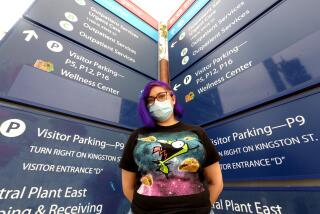Community Must Not Lose Trauma Center
- Share via
The possible elimination of King/Drew Medical Center’s trauma services by the Los Angeles County Board of Supervisors is not in the interest of the hospital or the Watts/Willowbrook community it serves. Without increased resources to the hospital, the closure of the trauma center will not simply translate into meaningful improvement or expansion of more basic medical services at King/Drew.
In addition, the community’s trauma victims will face prolonged transport times to care, and the entire county trauma network will be enormously strained. This will result in increased deaths, diminished quality of life and lost livelihoods as the quality of trauma care in the whole county suffers.
The Watts/Willowbrook community, beset by grinding poverty and violent crime, and arguably one of the most medically and socially underserved in the county, will be left with a still struggling public hospital without a trauma center.
It is the board’s responsibility to work to ensure safe, effective and accessible healthcare, not to dismantle our systems for providing that care piece by piece in our communities that need it most. We must not be duped by the board’s specious logic; this is an utterly bankrupt public policy that serves neither King/Drew nor the public good.
Jennifer Brody
Los Angeles
*
As an emergency physician practicing at one of the few remaining trauma centers in L.A. County, I can assure you that our emergency healthcare “safety net” is on the verge of collapse. Closure of the trauma unit at King/Drew would push us over the edge and result in the loss of lives in Southeast L.A., unless another hospital in the area joins the trauma network. Unfortunately, there just aren’t enough resources available to maintain the current system.
What can we do? I recommend a yes vote in November for Proposition 67, the emergency medical care initiative, which would provide more than $140 million for the county’s already jammed ERs and trauma centers. The money would keep ERs open, staff ERs with nurses and physicians, equip and train paramedics, fund clinics to which ERs can send nonemergency patients and improve the 911 phone system. All this for a small surcharge on phone bills: a maximum of 50 cents a month on residential phones, $1 on the typical $45 cellular bill. Business charges are capped at 3%, assessed only on in-state calling. All other phone fees are exempt.
Robert Hockberger MD
Redondo Beach
More to Read
Sign up for Essential California
The most important California stories and recommendations in your inbox every morning.
You may occasionally receive promotional content from the Los Angeles Times.









